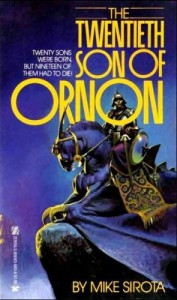Okay, this week I’m going to be a curmudgeon—something that I do quite well, actually. There are organizations, conferences, workshops—whatever—that stress sitting down with your laptops on fire and writing novels just as fast as you can. Write 5,000 words over a weekend. Or better still, write 50,000 words in thirty days. As a professional novelist and writing coach of nearly four decades, I disagree with this method of helping writers, or wannabe writers, to explore their creativity. Let me explain.
For starters, the reason I’m bringing this up right now is that November has been  designated National Novel Writing Month by a nonprofit organization of the same name—though better known as NaNoWriMo. They urge participants to write a “50,000-word novel” during the thirty days of the month, with a specific deadline of “11:59 p.m. on November 30th.” (Forget the fact that 50,000 words do not constitute a novel.)
designated National Novel Writing Month by a nonprofit organization of the same name—though better known as NaNoWriMo. They urge participants to write a “50,000-word novel” during the thirty days of the month, with a specific deadline of “11:59 p.m. on November 30th.” (Forget the fact that 50,000 words do not constitute a novel.)
WHO NEEDS A STINKING DEADLINE?
Consider this: Can you put a deadline on creativity? Can you put a word count goal on imagination? I don’t think so. Deadlines for novelists should be reserved for those few successful ones whose publishers want their next bestsellers written just as quickly as possible. For the rest of us, WHAT we write is far more important than HOW FAST we write it.
Being on social media I’m linked with many writers—published, self-published, unpublished, or otherwise. Quite a few proudly list their word count for the day, which does not impress me at all. You wrote 2,500 words today—so what? Was the scene any good? I would rather see a solid scene of 500 words that took some time and thought than a scene five times as long that will require extensive editing and revising down the road. To simplify, I reiterate the title of this post: write well, not fast.
A NUMBERS GAME
My opinion on this, to tell the truth, has evolved over time. I used to keep track of my daily word count—even before I had a computer that did it for me. That had to do partly with needing to know if I was staying within a publisher’s parameters of 70,000 words or whatever. But I’d be lying if I said that it wasn’t important to me back then.
If numbers impress you, then how about this? I wrote a 70,000-word sword & sorcery novel, The Twentieth Son of Ornon, in twenty days. Over a period of about ten years I wrote seventeen or eighteen novels, most of which were published.
So what did that mean? It meant that I wrote fast; it didn’t mean that I wrote well.
 Sure, I wrote the first draft of The Twentieth Son of Ornon in twenty days, but subsequent drafts to polish the work took almost two months more. Then, the publisher had me rewrite the opening; another couple of weeks. And decades later, when I reissued the book as The Sons of Ornon, I thought the original writing was crap and did a serious makeover on the book. Ditto most of the books in that ten-year span.
Sure, I wrote the first draft of The Twentieth Son of Ornon in twenty days, but subsequent drafts to polish the work took almost two months more. Then, the publisher had me rewrite the opening; another couple of weeks. And decades later, when I reissued the book as The Sons of Ornon, I thought the original writing was crap and did a serious makeover on the book. Ditto most of the books in that ten-year span.
I’ve worked with hundreds of writers over the years, and I have never told any of them that they write too slowly. I have only cared about the final product. Writers have come to me with their first novels that they’ve worked on for five years, six years, even longer. Others could pump out a 90,000-word first draft in six months or less. Some were quite proud of the latter—until I found enough wrong with their story to require another six months to a year of revisions before they got it right.
GETTING STARTED
These well-meaning organizations that emphasize word count and deadlines profess that they want to jump-start writers. To me, the risk is great that the opposite will happen. A person has been thinking about writing a book for years but hasn’t been able to start. Give them a deadline, and a word count minimum, and there could come a time—early in the program—when their frustration kicks in and they walk away from it, possibly forever. This seems self-defeating.
I’ve taught basic novel-writing classes at various educational institutions in Southern  California, which were often attended by those still thinking about writing. They have great ideas, or life experiences, whatever. So why haven’t they begun? Because they have jobs, and a family, and life is hectic, and 75,000-80,000 words seem so daunting, and (fill in the excuse du jour.)
California, which were often attended by those still thinking about writing. They have great ideas, or life experiences, whatever. So why haven’t they begun? Because they have jobs, and a family, and life is hectic, and 75,000-80,000 words seem so daunting, and (fill in the excuse du jour.)
What I tell them is this: THINK SMALL. Write one page a day. A double-spaced manuscript page is approximately 250 words, the same number of words you see here in red. If you do this every day, in about ten months you’ll have completed the first draft of a 75,000-word novel. Ten months—isn’t that doable?
For just about all of them, the answer was yes. And while some stuck to that exact formula, others found that a page a day just didn’t cut it when they were into a scene, and the 250 words grew to 350, then 500, and more. Some of my most successful writers began this way and now have multiple books published.
YOUR THOUGHTS, PLEASE
As my Parrothead guru once sang, that’s my story and I’m stickin’ to it. Seriously, I’m for anything that will get a person with a potential great story started writing. I just don’t feel that deadlines and word counts are the way to go.
I welcome your comments on this, pro and con. If you have a great deal to say, I might use it as part or all of a future post. Happy writing!

Reblogged this on Lee Fullbright's Room and commented:
Wise words from longtime author and writing coach, Mike Sirota.
How ’bout a half-page a day? That does sometimes define a good day for me! But would still rather have a half-page of something that might be taking me somewhere than pages and pages of pure crap (& I’ve had both). Loved this post, Mike! Reblogged *and* shared to my FB writing page.
Thanks so much, Lee. We’re of like minds on this subject. And yeah, half a page a day is just fine!
Deadlines work for me personally. I’m participating in NaNoWriMo this year, but not worrying about the word count goal specifically. I’ve broken down my outline (that I have been working on for months) into scenes that I want to accomplish getting onto paper every day. I fear that if I don’t get everything in the arc onto paper before I start really going into deep edits I will never get it all down. I see it like I need all of my clay in front of me on the wheel before I can start shaping it into something truly beautiful.
I know that every day’s work may not be perfect, but I also refuse to write crap just for the sake of a word count. Garbage is just as worthless to me as a blank page.
Revisions are something I know I will have to do. I think you are right when you say that the danger lies in writers thinking that have a large number of words that they are done. But I have also met writers who get so hung up on getting their work so perfect before moving on and that they never get their story all out on paper.
Great points, my friend. I’m for anything that will get a writer started–and forging ahead–and as long as they don’t get hung up on, “I gotta do 758 more words to meet my quota today,” I’m fine with it. Best of luck with your project.
And welcome to my blog!
I wrote the following before EJSmith3130 posted. In some ways, we’re saying the same thing, only sideways. From what I can tell, he did it correctly from the start, so he was ready for a marathon writing session. Anyway, here goes…
As you know, I started writing as an outlet for my creative energies and workaholism after parting ways with a software company during the last financial ruckus. I no longer remember the exact date when I first hit a word count of 890,527, but it was more than one year and less than two years. Much less. I’ll let anybody who cares to know do the math on that as far as monthly production is concerned.
The point, in my case, is that quantity isn’t quality. And before everybody rushes to say, “Of course not,” please allow me to say why that was true for me. I had no plot outline or character backstories created, so every little thing about my universe, my characters, and their predicaments ended up on the page. I didn’t take the time—and those trying to meet an artificially short deadline might not have the time—to think things through in a more organized fashion. When I finally realized that I wanted to take writing seriously, I found myself with three to four books worth of decent material buried under a huge pile of crap.
Someone other than Mike recently told me that (in their opinion) it’s a lot easier to edit the extraneous words or plot points out of your story than it is to add in new ones, but I haven’t found that to be true. Any good story builds from what came before, so pulling one thread can unravel a whole lot of plot. Fixing the problem of going too far in the wrong direction can be a nightmare, and I’ve been living with that for longer that it took me to create the problem in the first place. While that exercise (mostly with Mike as the whip-cracker) has been highly educational, I’d much rather have taken the time to think things through before doing what amounted to a brain dump.
A few days ago I got the Book One manuscript back from round two with my line editor, Kevin, who has been able to provide a second set of fresher eyes. It’s now at a (believe it or not—lean)150,000 words that bear only passing resemblance to the source material. If I believe both Mike and Kevin, it’s finally come together in a strong, well-paced story.
Looking back, all I can say is that a page-a-day limit of well thought out material would have saved me—and Mike—a whole lot of grief. Looking forward, I still have a huge pile of crap under which to find the next pony. While my skills at shoveling have improved greatly, with expert guidance, my heartfelt advice to anyone else is not to create that problem for themselves in the first place…or at least do things more like E.J. Smith seems to have done.
Gawd, 890,000+ words! That boggles the mind. Thanks for your thoughts, Kate.
You’re a man after my own heart. I always look askance at NaNoWriMo because I’ve seen so many who get set up for failure. People puke their guts out on cyber paper and actually believe their tomes are ready for publication. Eeek. I suppose it’s a nice kick in the pants for some because it forces them to tell themselves their story via the first draft, but much of it smacks as wanna-be writing. Like you say, write well, not fast. In fact, that’s always been one of my mantras that I tell our authors during the editing process not to hurry their edits, because I want it right, not fast.
Guess I’m being curmudgeonly right next to you, aren’t I?
Let’s hear it for the curmudgeons of the world! Thanks, Eddie.
Another curmudgeon wading in here. I’ll always take quality over quantity. Lately I’ve met several people who think that professional writers produce vast quantities of prose on a daily basis. And then maybe take an afternoon to edit those 250,000 words down into a Hugo-worthy novel. They laughed when I told them I was happy with a polished page a day. I remarked on my meager output to none other than Vernor Vinge and he exclaimed “A polished page a day? You’re prolific! Keep at it!” That’s encouragement.
Curmudgeons rule, eh, Mark? Thanks. 🙂
My guitar teacher told me long ago that five minutes of concentrated practice was worth an hour of just noodling around. Quality trumps quantity every time.
Ah, another curmudgeon chimes in! 🙂 Thanks, Dr. Bill.